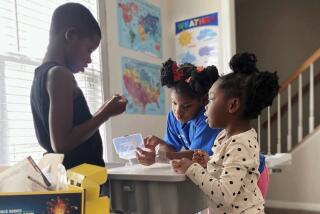An Assignment to Rethink the Idea of Homework
- Share via
WASHINGTON — Parents, so goes one of education’s mantras, must be involved in their child’s schooling. But when it comes to homework, David Martin isn’t so sure.
The 13-year-old, an honors student who attends a suburban middle school, spends about two hours a night on homework. He occasionally asks his parents, both doctors, to proofread reports, but sometimes he regrets it.
“They screw up as much as they help,” David said.
Karen Chaisson isn’t sure, either. Her daughter is a fifth-grader, and the stress of getting homework done--for two to three hours a night--is too much for both of them.
“Homework is the bane of my existence, because it seems to be more of a hindrance than a help to my daughter,” Chaisson said.
It’s hard to find anything more contentious about the school experience than homework. Though studies are inconclusive about basic principles, such as whether and what kind of homework is effective, teachers in recent years have laid it on with increasing vigor: A 1999 University of Michigan study found that from 1981 to 1997, the average amount of time spent rose from one hour, 25 minutes a week to two hours, 14 minutes. Increasingly, parents are expected to become involved.
Homework is intended to be a bridge between home and school, to expand learning opportunities and allow parents to see what their child is doing. The importance of parent involvement in education has become so great that schools cannot receive federal Title I funds without forging “contracts” with parents that, in part, extract promises that homework will be done.
Yet a 1998 study by the nonprofit Public Agenda showed that half of the parents said they have pushed their child to do homework to the point of screaming, and 34% said it has become a source of struggle.
A growing number of students and parents wonder whether there aren’t better ways to involve parents in a child’s education.
“The whole idea that homework is a bridge needs to be challenged,” said Etta Kralovec, co-author of “The End of Homework” and vice president for learning at Training and Development Corp. “Our research shows that rather than providing a bridge, homework confused parents about what their kids are doing in school and led to a tremendous disconnect between the family and the school.”
Working and single parents say time constraints often make it impossible to help. Some students say their parents can’t understand their homework. And some parents concede that even when they do, they can confuse their children by trying to teach them how they learned it decades earlier.
David could ask his mother, Lisa, who majored in math at Harvard University, for help in geometry, but he opts for his twin brother instead.
“It’s easier,” he said.
Tension inherent in the parent-child relationship is another factor. In many households, it is fraught with enough difficulty without giving the parent a new role as teacher.
According to the Public Agenda survey, 22% of adults admitted doing part of their child’s homework. Many teachers say they can tell, but students complain that they get no credit for doing the work themselves.
That’s why Priscilla Vail, a longtime teacher and learning specialist, urges teachers to tell their students: “‘If you are one of the people lucky enough to have involved parents, please put your project here on this table. If you have to do your work all on your own, getting your own materials and doing it yourself, would you please put your project on this table.’ Nobody is going to cheat, and it dignifies both approaches.”
Educators say parents must provide the proper environment and materials, said Harris Cooper, chairman of psychological sciences at the University of Missouri-Columbia.
They should also ask their children about their work and make sure they have time to do what is assigned, educators said.
Parents say teachers must coordinate homework assignments so students don’t have too much any one night. Dorothy Rich, creator of MegaSkills, a Washington-based program used in thousands of U.S. homes and schools, said many teachers pile on homework to make up for deficiencies in the classroom, which robs students of valuable time.
“If you are doing homework, you are not doing something else,” Rich said. “You are not riding your bike, you are not reading other materials for pleasure, you aren’t exercising. These things are as important.”
More to Read
Sign up for Essential California
The most important California stories and recommendations in your inbox every morning.
You may occasionally receive promotional content from the Los Angeles Times.













